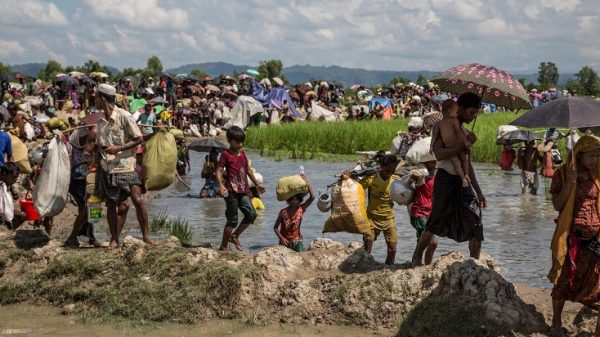
On 16 October 2017, Rohingya refugees including women and children cross into Bangladesh at Palong Khali in Cox’s Bazar district. Between 10000 and 15000 newly arrived Rohingya refugees fleeing Myanmar crossed into Bangladesh, and are stuck in Palong Khali in Cox’s Bazar district approximately 2 kms from the border with Myanmar. Thousands of people are queuing up on pedestrian road in the midst of paddy fields and waterbodies in a queue approximately 1 km long. Thousands among them are children. People making long journeys by walking and crossing the river are in desperate condition. They are exhausted, dehydrated, hungry and are urgently in need of water. People are getting sick due to dehydration, while lots are also traumatized. Some children have been separated from their families during their journey. UNICEF has mobilized resources for the newly arrived Rohingyas. Two water trucks carrying 6000 litres of water and 2000 jerrycans are on the site for distribution. Distribution started this morning by boat to the refugees located near the border area. Another 20,000 bottles of water each containing 1.5 litre are on the way from Chittagong. UNICEF is prepositioning two mobile child friendly spaces at the site for assessment and family tracing and reunification. UNICEF also plans to mobilize immunization and nutrition screening for this new influx. Two UNICEF nutrition and health teams are currently on the ground.
As of 15 October 2017, at least 795,000 Rohingyas are estimated to be sheltering in Bangladesh, having fled violence and persecution in Myanmar. Violence which began on 25 August has triggered a massive and swift refugee influx across the border - an estimated 582,000 people have arrived. These refugees have joined some 213,000 people who were already in Bangladesh following earlier waves of displacement. The Rohingya population in Cox’s Bazar is highly vulnerable, many having experienced severe trauma, and are now living in extremely difficul
The United States, the United Kingdom, the European Union and the United Nations High Commissioner for Refugees will bring the international community together Thursday to address the Rohingya crisis.
At a virtual conference, they will urge countries to increase assistance for Rohingyas, host communities, and internally displaced people in Myanmar, more than three years since the latest phase of the crisis began in August 2017.
The UN has appealed for more than $1 billion in aid to meet the humanitarian needs of Rohingyas in Bangladesh this year, but so far less than half has been contributed.
This leaves a significant funding gap, made worse by the COVID-19 pandemic. The speakers will discuss the outcomes of the conference, including efforts to address the dire humanitarian crisis on the ground and to increase assistance to respond to the plight of Rohingyas in Bangladesh and elsewhere in the region, as well as internally displaced persons in Myanmar.
The co-hosts will also discuss the voluntary, safe, dignified and sustainable return of Rohingyas and other displaced people to their homes or to a place of their choosing.
After offering opening remarks, the speakers will take questions from participating journalists.

















